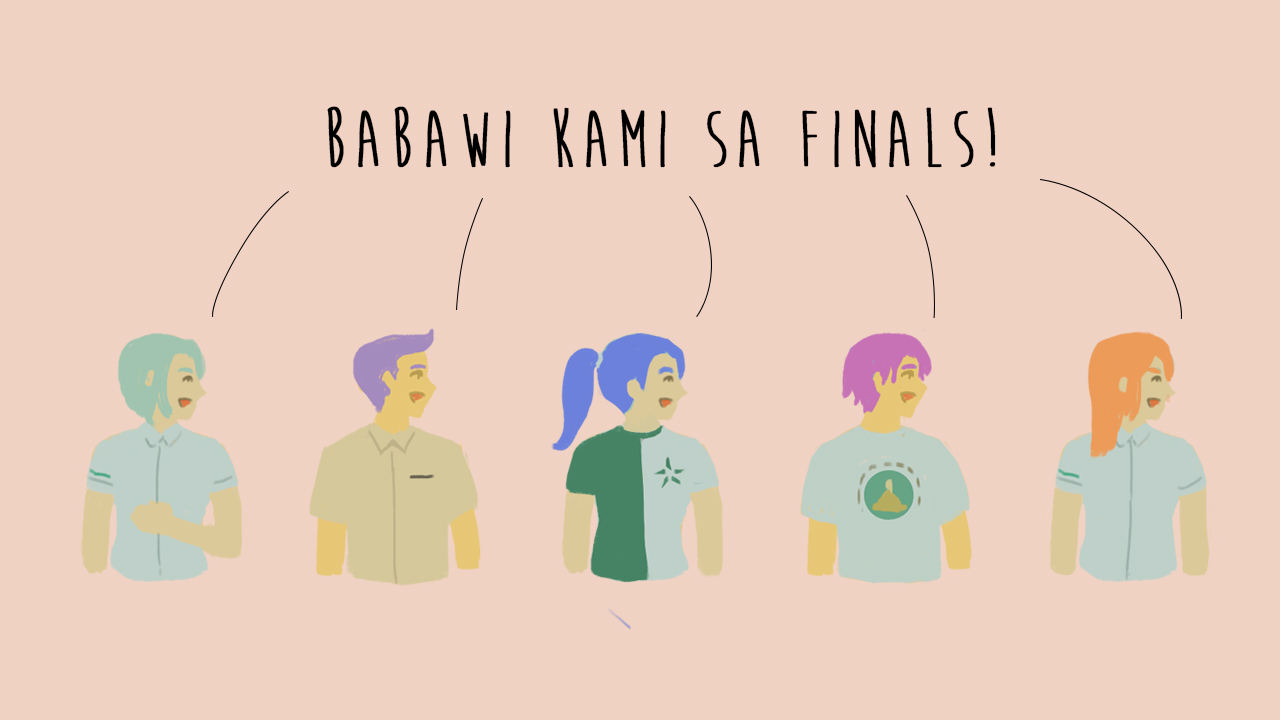‘Babawi ako sa finals’ and how to forge its meaning
When Bernadette Miciano and Marclee Agustin entered DLSU-D four years ago, their study plan was clear—they’d give their best during prelim and midterm, so they could just “chill” during finals.
But things got complicated for both of them. Marclee failed a subject and Bernadette shifted to another course. College got tougher and balancing everything became more and more of a struggle. Prelim and midterm passed, so they said to themselves: “Babawi ako sa finals.” #relatable
But did they?
“May finals pa naman”
“Babawi ako” is every student’s mantra. We never fail to hear this oath as it echoes in rooms and hallways—especially after quizzes or exams.
Striving to reach a certain quota grade, Management Accounting students like Bernadette are guilty of saying this to themselves several times in the past. “It’s because if I fail [a major subject], I will be overly delayed,” she mentioned. “So I always tell myself, babawi ako sa finals.”
Meanwhile, graduating Communication Arts student Marclee shared the same experience. He knows what he’s supposed to do when he entered college—study hard and graduate—except that it’s never that easy.
“One time, I failed my exam in Business Math,” Marclee recalled. “I told myself, babawi ako sa finals. And I tried my best to do so. I reviewed the formulas. I committed myself in seat works and projects. I tried my best, but I missed one point. My grades didn’t make it.”
“Babawi talaga ako sa finals”
Sadly, we fail to realize that the “Babawi ako sa finals” mentality is a clear manifestation of our undying Mañana habit, or “mamaya na” in Filipino. In the context of students, it is called academic procrastination, a conscious delay of action leading to zero accomplishments. About 30 to 60 percent of undergraduate students procrastinate over their workload, making it a widespread phenomenon in college, as per psychologists Albert Ellis and William Knaus in their book Overcoming Procrastination.
In the University, selected Lasallians have a moderately procrastinating behavior, based on a 2006 study by AB Psychology graduates Geny Mercado and colleagues titled The relationship between the academic procrastination and academic performance among AB Psychology students of DLSU-D.
This procrastinating habit can be helpful sometimes, Marclee explained. “Saying ‘babawi na lang ako sa finals’ is a relief. Our feeling [of being a failure] during prelim and midterm don’t get bottled up.” But he added that academic procrastination can be a dangerous loop too. He said that the tendency of students, including him, is to abuse all available chances. We tell ourselves: Let’s forget about our past failures, ‘may susunod pa naman’. Besides, ‘may midterm pa naman’ and ‘may finals pa naman’. And when all else fail that semester, ‘may next sem pa naman’.
This is exactly where most students fall in the trap, we think we still have a lot of time yet. We know that our tendency to procrastinate is a bad idea—but we do it anyway, telling ourselves we can just bring it on during finals. We fail to realize that our time in college is finite and we have to do our best each time, as we prepare ourselves to leave the University and face reality outside.
Forging its meaning
So, should we despise those who procrastinate? Definitely not. The belief that students who procrastinate are lazy and terrible in managing their time isn’t entirely true. It goes beyond poor time management and laziness, said McGill University Psychology professors Caroline Senecal and Richard Koestner. Doubtlessly, procrastination can be a terrible habit, but it’s also a way of expressing internal conflicts as majority of students procrastinate due to fear of failing.
Fortunately, the “babawi ako sa finals” attitude can turn into a positive reinforcement if we will forge its meaning. Clinical Psychology professor Andrew Solomon in Columbia University said that “Forging meaning is about changing yourself.” And by changing ourselves, he meant changing our point of view. This is how Marclee and Bernadette turned each of their failures into redemption.
“I wanted to redeem myself [after I failed Business Math],” Marclee shared. “The entire summer term, I’ve been reminding myself these two words—babawi ako. That was the turning point of my college life and I was full of grit after that. I realized I am capable.”
Forging the meaning of this procrastination loop helped Bernadette realize that “Babawi ako sa finals” is meant to empower us, not to turn us into worse procrastinators. “I’m already near the finish line,” she said. “Is there any more reason to quit?”
***
Some Lasallians can steadily work their way through college with productivity tips and study hacks—but that’s not the case for all. Some say ‘babawi ako sa finals’ and find themselves stuck in the loop. But there’s a way to escape this, as what Marclee and Bernadette’s stories prove. If saying ‘babawi ako’ as a positive reinforcement worked for them, it can work for us too.
Marclee wants Lasallians to know: “[When I finally passed Business Math in the summer term] that’s when I knew I can make it. Kaya ko naman pala.”
Note: All quotes in Filipino were translated to English.





